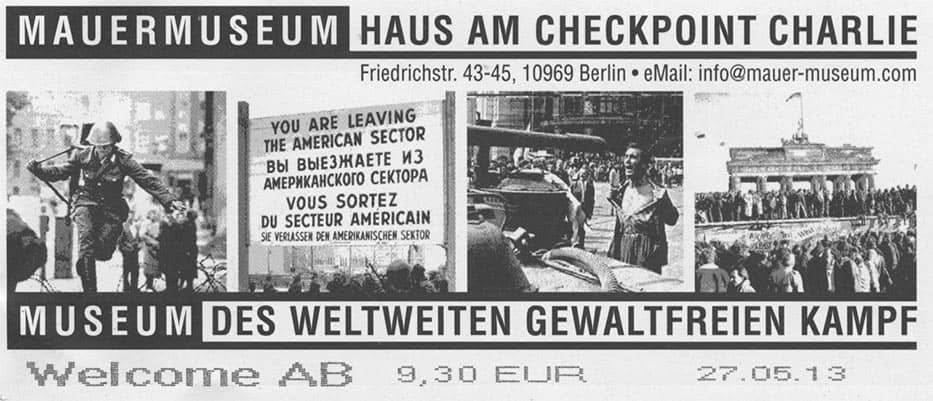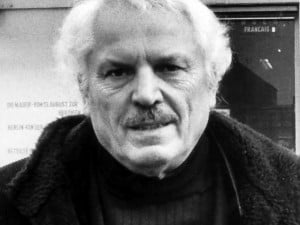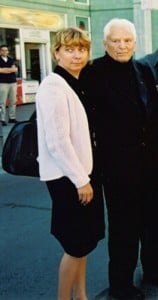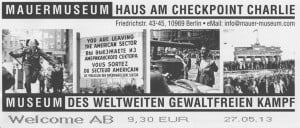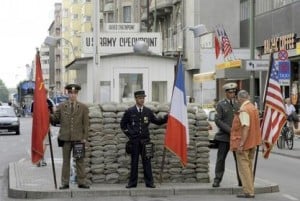By Anne Brugts, content manager Story Terrace
A Museum for Freedom
Right next to the former Checkpoint Charlie, in an apartment block fronting onto the street, you can find the Mauer Museum. Since its foundation in 1962, it’s been an institute for promoting freedom and for keeping alive memories of the Berlin Wall. Alexandra Hildebrandt is the dedicated chair of the museum and she tells us about the museum’s history, its founder and her ambitions.
The museum was founded by Dr Rainer Hildebrandt. During the Second World War Rainer was already a champion of human rights, but he really made a name for himself with the publication of a list of 9.000 people arrested by theSovietRegime in East Germany. The list was drawn up with the help of the Red Cross and consisted of people suspected of political dissent. Dr Hildebrandt himself had been imprisoned by the Nazis for 17 months during the Second World War.
Together against the wall
When the construction of the wall started in 1962, Rainer acted immediately. In imitation of Ghandi, he preached revolt in a non-violent way. He therefore started the Mauer Museum on the symbolic and strategic location of Checkpoint Charlie. It was a symbol of resistance. The museum was, in its early years, not much more than a three-room apartment displaying objects people had used in escaping from East Germany. As well as running the museum, Rainer took an active part in helping civilians flee from east to west.
Many years later, the Ukrainian artist Alexandra Hildebrandt came to Berlin. She was hoping to exhibit her work in the West German part of the city. It was the late eighties, and once Gorbachev had started his policy of Perestroika, it was no longer an impossible dream for people from eastern Europe to travel to the west. Alexandra had a go, and on her trip to West Berlin she met Rainer.
She was inspired by his impassioned acts and goals and his firm conviction that the Wall was to fall. When she returned to her homeland after a short stay, he kept calling her every single day. Three months later, he convinced her to return to West Berlin to stay. Since then, she ran the museum with him until his death in 2004.
Human rights worldwide
Recently, the museum has been focusing on world-wide human rights, as well as the commemoration of the wall. Its displays tell stories from political prisoners and activists in, amongst other places, Russia, China, Cuba and North Korea. Furthermore, they spread word about these people and support them financially and politically. For example, they assisted in the escape of the Russian writer and activist for human rights Mikhail Khodorkovsky.
Alexandra speaks about the realisation that freedom isn’t a natural law and a guarantee. ‘People living now take their freedom for granted, like it’s a given. But it’s not. People have died for the freedom we now enjoy.’ She feels it’s her task to make people aware, even 25 years after the fall of the wall. ‘Therefore, the museum is always open 365 days a year, from 8 in the morning until 10 in the evening. That way, we can spread the word continually.’
Twenty-five years of freedom
Awareness and remembrance: that’s what the museum strives for. ‘We are never to forget that the wall was there once. It was the most horrific building you can imagine. The Chinese wall separated people for protection, but the Berlin Wall aimed solely at separating them. For no reason. The result was a prison and we must always remember this historical truth to prevent it happening again.’
How does Alexandra look back on 25 years of freedom? ‘It’s wonderful and we must be very thankful for it. Berlin has grown together as one city and there are no visible borders any longer. But to me, the coming 9th of November is only partly a special day. Actually, I believe that every day of the year should be a commemoration. But obviously, 2014 is certainly a memorable year.’
______________
About us: Story Terrace helps customers to capture personal stories in beautiful books alongside a professional writer. Our writers have a range of backgrounds and interests, sharing one passion: Portraying individuals through carefully crafted anecdotes and lively stories.
For more information on having your stories written down, send an e-mail to info@ or get in touch via our contact form.
This month we celebrate that 25 years ago the Berlin Wall came down. What’s your memory of this historical fact?
